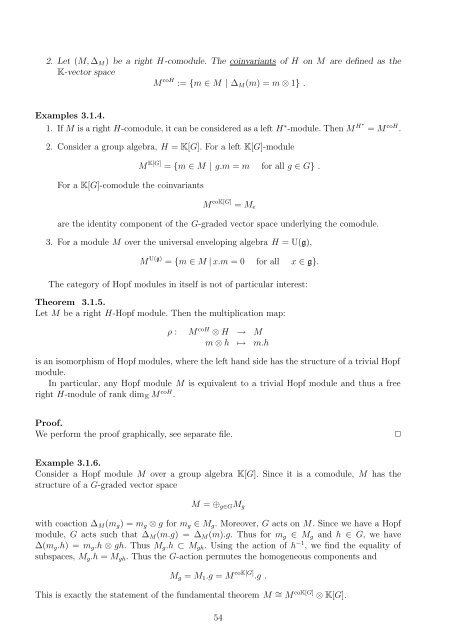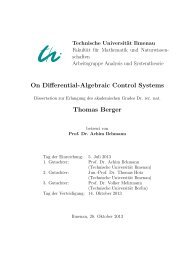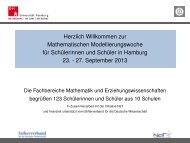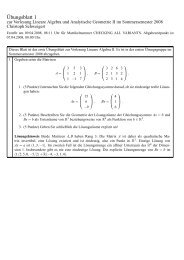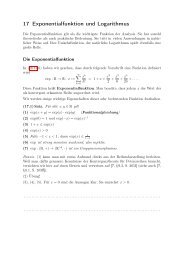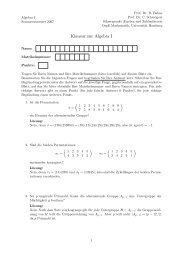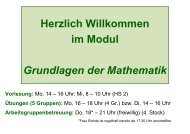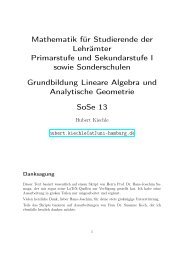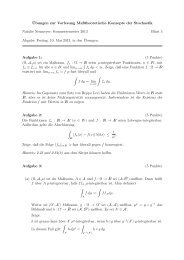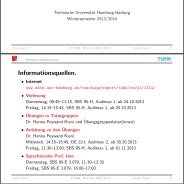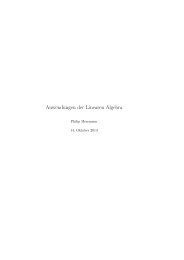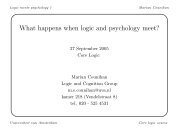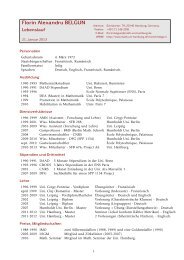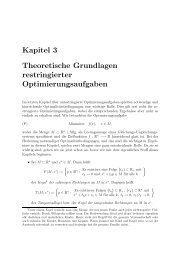pdf file
pdf file
pdf file
You also want an ePaper? Increase the reach of your titles
YUMPU automatically turns print PDFs into web optimized ePapers that Google loves.
2. Let (M, Δ M ) be a right H-comodule. The coinvariants of H on M are defined as the<br />
K-vector space<br />
M coH := {m ∈ M | Δ M (m) = m ⊗ 1} .<br />
Examples 3.1.4.<br />
1. If M is a right H-comodule, it can be considered as a left H ∗ -module. Then M H∗ = M coH .<br />
2. Consider a group algebra, H = K[G]. For a left K[G]-module<br />
For a K[G]-comodule the coinvariants<br />
M K[G] = {m ∈ M | g.m = m for all g ∈ G} .<br />
M coK[G] = M e<br />
are the identity component of the G-graded vector space underlying the comodule.<br />
3. For a module M over the universal enveloping algebra H = U(g),<br />
M U(g) = {m ∈ M | x.m = 0 for all x ∈ g}.<br />
The category of Hopf modules in itself is not of particular interest:<br />
Theorem 3.1.5.<br />
Let M be a right H-Hopf module. Then the multiplication map:<br />
ρ : M coH ⊗ H → M<br />
m ⊗ h ↦→ m.h<br />
is an isomorphism of Hopf modules, where the left hand side has the structure of a trivial Hopf<br />
module.<br />
In particular, any Hopf module M is equivalent to a trivial Hopf module and thus a free<br />
right H-module of rank dim K M coH .<br />
Proof.<br />
We perform the proof graphically, see separate <strong>file</strong>.<br />
✷<br />
Example 3.1.6.<br />
Consider a Hopf module M over a group algebra K[G]. Since it is a comodule, M has the<br />
structure of a G-graded vector space<br />
M = ⊕ g∈G M g<br />
with coaction Δ M (m g ) = m g ⊗ g for m g ∈ M g . Moreover, G acts on M. Since we have a Hopf<br />
module, G acts such that Δ M (m.g) = Δ M (m).g. Thus for m g ∈ M g and h ∈ G, we have<br />
Δ(m g .h) = m g .h ⊗ gh. Thus M g .h ⊂ M gh . Using the action of h −1 , we find the equality of<br />
subspaces, M g .h = M gh . Thus the G-action permutes the homogeneous components and<br />
M g = M 1 .g = M coK[G] .g .<br />
This is exactly the statement of the fundamental theorem M ∼ = M coK[G] ⊗ K[G].<br />
54


